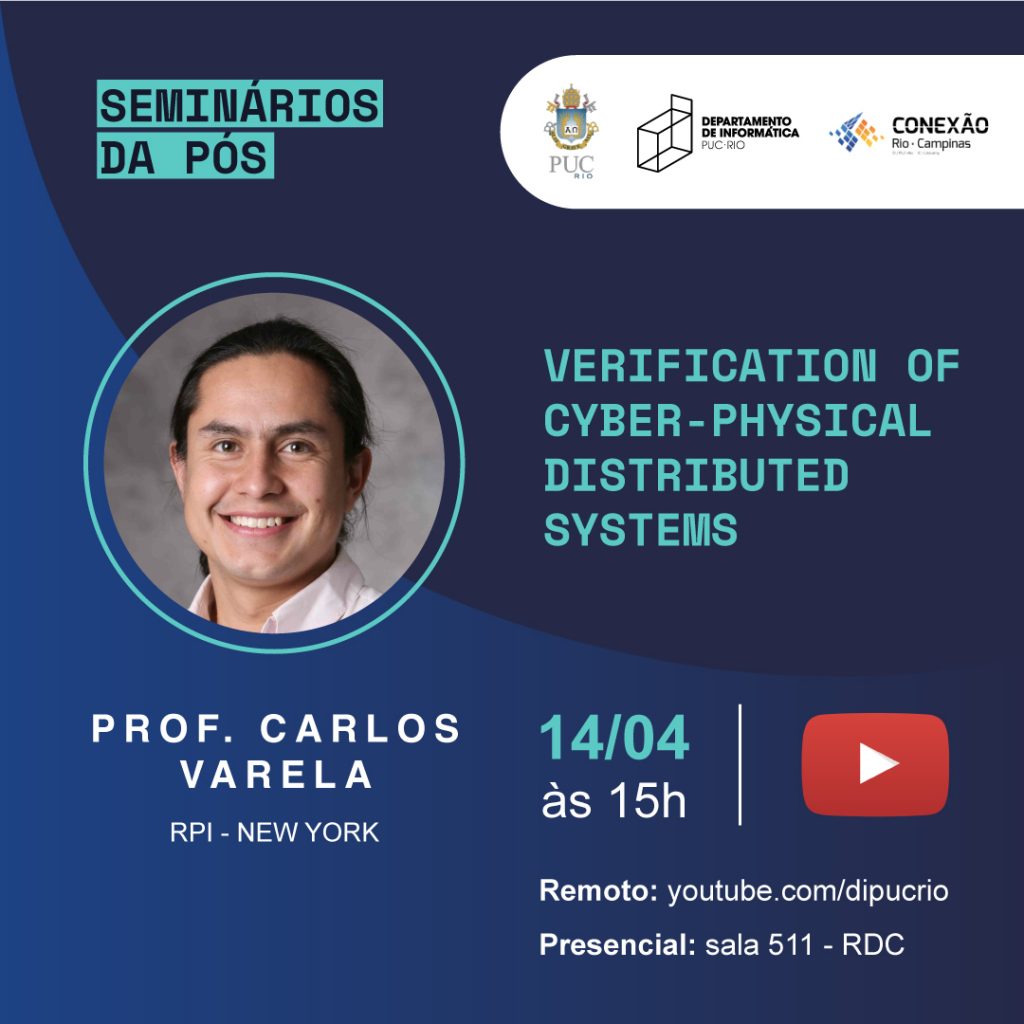 Dia 14/04, às 15h, acontecerá o seminário “Verification of Cyber-Physical Distributed Systems”, proferido pelo Prof. Carlos Varela.
Dia 14/04, às 15h, acontecerá o seminário “Verification of Cyber-Physical Distributed Systems”, proferido pelo Prof. Carlos Varela.
O Seminário será na sala 511 do RDC, com transmissão ao vivo via Youtube pelo canal do DI, através do link: https://www.youtube.com/watch?v=0AIuhqVXcWk
Resumo do Seminário:
Cyber-physical systems (CPS) are concurrent, often distributed, and contain hardware and software components that interact with the real world, e.g., avionics in flight systems. Verification of CPS requires a modular principled approach. Model checking techniques suffer from CPS’s large state space and inherent stochastic behavior, e.g., from unknown wind and weather conditions. Since models of the physical world are incomplete, data from sensors can be used to reduce uncertainties. Resulting dynamic data-driven applications and systems (DDDAS) can outperform static pure model-based CPS approaches, yet their verification is even more challenging due to the inherent feedback loop adjusting physics-based models to sensor data. We will discuss a theorem-proving approach to verifying concurrent and distributed systems and the notion of correctness envelopes to capture stochastics of DDDAS enabling a modular reusable approach to the verification of their statistical properties.
Conheça o Professor:
Dr. Carlos A. Varela is Professor of Computer Science and Founding Director of the Worldwide Computing Laboratory at Rensselaer Polytechnic Institute. He is Associate Editor of the ACM Computing Surveys, the IEEE Transactions on Cloud Computing, and the IEEE Internet of Things Journal. He has authored the book “Programming Distributed Computing Systems: A Foundational Approach” (MIT Press, 2013). He was the General Chair for CCGrid 2016. He is PC Co-Chair for the InfoSymbiotics/Dynamic Data Driven Applications Systems (DDDAS2022) conference and was the PC Chair for the 2020 IEEE/ACM International Conference on Cluster, Cloud, and Internet Computing (CCGrid 2020), the 2011 IEEE/ACM International Conference on Cluster, Cloud, and Grid Computing (CCGrid 2011), the 2012 IEEE/ACM International Conference on Utility and Cloud Computing (UCC 2012,) and the ACM AGERE! Workshop on Programming based on Actors, Agents and Decentralized Control at SPLASH 2014 and 2015. Dr. Varela has given 79 invited talks, including 12 plenary lectures on his research at international and national venues. He has been a member of 87 conference and workshop Program Committees. He has supervised seven Ph.D. students and 18 M.S. students. He and his students have received Best Paper awards at HPDC-GECO 2006, eScience’2007, CCGrid’2007, CLEI 2010, CCGrid’2016, DASC 2019. He is also a recipient of the NSF CAREER Award, and industry awards from IBM, Google, Amazon, and PSEG. His research is currently supported by the National Science Foundation and the Air Force Office of Scientific Research. Dr. Varela is also an instrument-rated private pilot with over 1100 hours of flight experience, including cross-country trips from NY to CA, IL, TX, and FL. His current research interests include safer flight systems, software verification, cloud computing, middleware for adaptive distributed systems, and concurrent programming models and languages. Dr. Varela received his B.S with honors, M.S., and Ph.D. degrees in Computer Science, all from the University of Illinois at Urbana-Champaign. Prof. Varela will be on sabbatical until the Fall of 2023. Prof. Varela will visit GE Global Research’s Control and Optimization’s High Assurance Systems group at Niskayuna, NY, the University of Los Andes at Bogota, Colombia, and PUC-Rio at Rio de Janeiro, Brazil. For more information on Prof. Varela’s group’s research, please visit the Worldwide Computing Lab page: http://wcl.cs.rpi.edu/
Essa palestra é mais um evento da série de seminários Conexão Rio-Campinas, uma parceria entre o Departamento de Informática da PUC-Rio e o Instituto de Computação da Unicamp, que promove importantes debates e palestras sobre os últimos avanços na ciência da computação, na Inteligência Artificial, em aprendizado de máquina, Ciência de Dados entre outros temas relevantes para profissionais, pesquisadores e para a sociedade como um todo.


